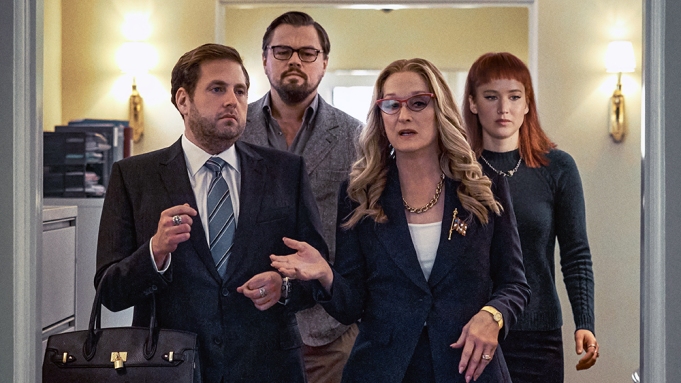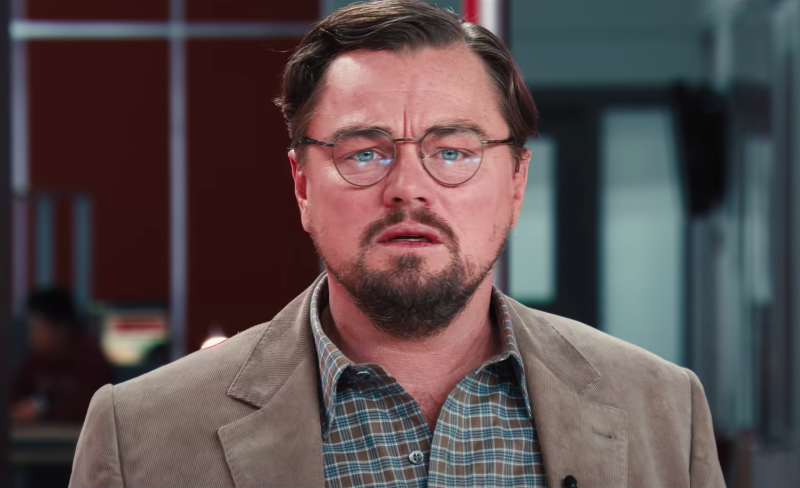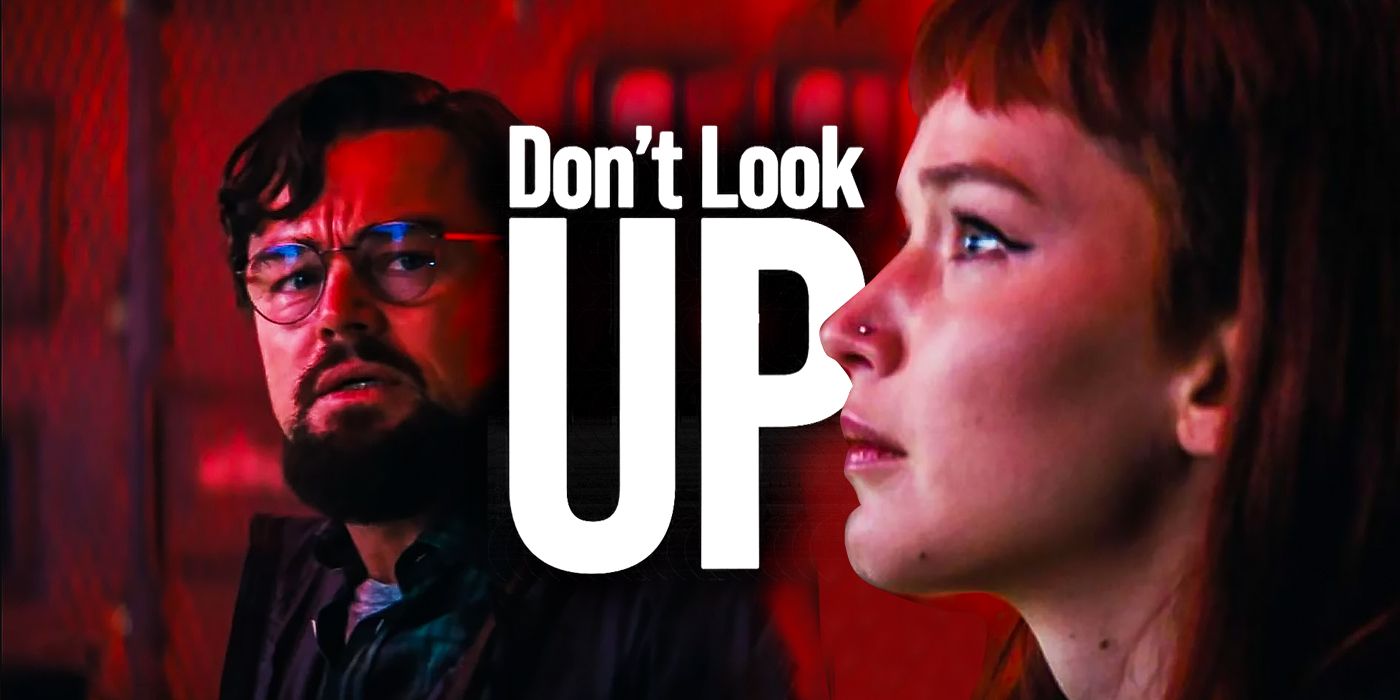By Ermioni Pavlidou,
Adam McKay’s apocalypse-is-approaching comedy is out in theatres and available on Netflix and the scenario depicted in it bears a few similarities with our own apocalypse-like battle that humanity has been facing almost for two years now. Disbelief, conspiracy theories, panic, misinformation, social media drama, and misleads are all, Don’t Look Up‘s concern intertwined with an actual imminent catastrophe, all through the lens of McKay’s dire need to be relatable and discerning, which led to an incomplete reheated attempt at serious but all the more (ill-performed) humorous movie with a misused relentless catalog of a stellar cast. Spoilers ahead —read at your own risk!
The movie begins with Kate Dibiaski (Jennifer Lawrence), a “would like to be presented as quirky” doctorate astronomy student at a not as respected as a prestigious school, the University of Michigan, discovering a meteor that will hit Earth in approximately 6 months and 14 days that will have a bigger impact than that of Chicxulub, which eliminated the dinosaurs. She consults her supervisory and awkwardly presented professor, Dr. Randall Mindy (Leonardo DiCaprio), and their quest accompanied by Dr. Teddy Oglothorpe (Rob Morgan), a NASA high-rank scientist, to inform and, ultimately, save the world begins. What the movie really tries to put into frames is how modern life affects people’s reactions to direct destruction. Filled with too many separate issues that are not handled thoroughly, the film shows a general indifference from the point of view of the people and their illogical distraction with matters that are clearly of less importance than the literal extinction of the human race.
The scientist assembly reaches the White House with the aforementioned disturbing news where the response is, to say the least… unresponsive. The President of the United States, Janie Orlean (portrayed by Meryl Streep), and her confidant, who is also her son, Jason Orlean (Jonah Hill), are too preoccupied with something of laughable urgency compared to the end of the world to even meet with them, and when they finally do, their lack of interest and sheer focus on the elections’ campaign is overbearing. Eventually, they are forced to realize the danger, to cover up a scandal that could ruin their campaign. The mission to counterattack and destroy the comet is abruptly interrupted, because the main investor — whose character is presented as a robot-like hyper villain filthy-rich-genius that looks for multiplying his profits from everything — and millionaire Peter Isherwell (portrayed by Mark Ryland) wants to benefit from the harvesting of the comet. And so, a surreal course of misinformation begins.

The scientists are divided. Mindy, who sugar-coats the situation to the public as official representatives of the U.S. Government, and Kate and Teddy, who are thrown off the operation. From then, the plot is filled with too many elements that are put through scrutiny, thus losing the coherence it was trying to contain by its declining narration and cliché-filled characters. The main characters teamed up again and started a campaign named “Look Up” (as by that time, the comet was finally visibly close to Earth) to persuade people that danger emerges and rebel against the government’s nonchalant politics, while the government preached “Don’t Look Up”, and when the Isherwell’s missiles failed to intercept the meteor, Mindy visits his family and spends the last hours of the Earth with them along with Teddy, Kate, and her boyfriend (Timothée Chalamet).
A promising premise and what went wrong in its application
Despite McKay’s successful attempts at social and political sharp commentary via his movies (Anchorman, to be precise), this particular time, the movie got overwhelmingly lost in its references and reached only the surface of what it actually wanted and could have said. All the characters have a predictable aspect that detracts their individuality and originality that would attach the actual jokes on. Furthermore, the great actors that were gathered in various scenes altogether were not utilized to their maximum capacity. Meryl Streep has a generic villain role from passive-aggressive laughs to siding with the enemy. Jonah Hill is an obnoxious trust fund kid hiding behind his mom. Leonardo DiCaprio is an adult “nerd” and a socially awkward person with anxiety but is handled like a teenage boy in teen movies, as is Lawrence’s character. Cate Blanchett and Tyler Perry are the anchors of a show that resembles an exaggerated SNL sketch, with no depth or any contribution to the coherence of the plot. Ariana Grande is a singer, Riley Bina, whose appearance is attached to her on-and-off relationship with another famous person, DJ Chello (played by Kid Cudi) to spark a discussion about the excessive amount of attention given to such classic Hollywood gossip.
Furthermore, one of the problems was the plot. The plot has weaker spots and perfunctory analysis of the attempt at a political satire. Rich people wanting to take advantage of the obviously dangerous situation to get richer is not as compelling as it should be and only “scratches the surface”. There is also the side story with Blanchett being the other woman (written in a rather sexist way, may I add) and DiCaprio being consumed by the attention of the public and “important people”, leading to a trite yet — in my opinion — suitable ending. Last but not least, the overall critique, which was aimed at everything and nothing, was tiring. It criticized social media and how they contort opinions, modern industry, and people that care more about celebrity news than international danger, the greed of the insatiable, American capitalistic and profit-chasing culture was reflected as something out of control in general, it became chaotic.

Although this movie was one that was anticipated due to its all-star cast and the filmmaker’s history with previous clever movie samples, its depiction was lost in its writing. There were moments that set the plot’s course to a comprehensible path with the push of the exceptional acting of the amazing cast, but it was quickly derailed by the weight of too many points that were integrated to be made.
References
- Don’t Look Up movie review, rogerebert.com, Available here
- Don’t Look Up Is a Climate-Change Comedy That Hates Having to Entertain, vulture.com, Available here




